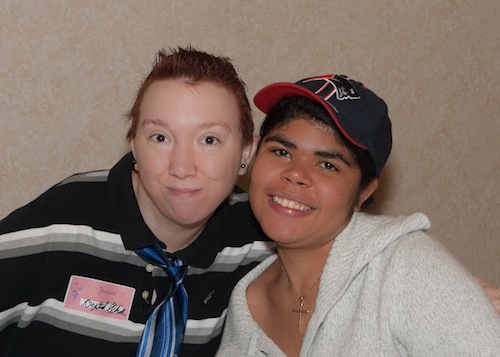


Young people with disabilities can earn money doing contract labor while learning valuable skills for future employment opportunities. (Photo courtesy of Paige Connors, American Training, Inc.)
The Newark Advocate reporter L.B. Whyde’s profile of employment specialist Linda Hogue this past Monday illustrates the potential that can be tapped in young people with disabilities when given the opportunity to work.
Hogue’s organization provides contract services for area businesses, where people with disabilities perform manual tasks that include jewelry-making and water bottle assembly. But at the same time these people are earning money, Hogue is working with them on skills that will help them succeed in future places of employment. Whyde writes:
Some of the things Hogue focuses on with the students include how to get along with other people, attitude, appearance, personal hygiene, following directions, teamwork and accepting constructive criticism.
One of the reasons for Hogue’s success is the age of the population she is working with; the program focuses on people with disabilities between ages 14 and 22 as they are transitioning from life in high school to being post-graduates. When the caption accompanying Zach Gray’s photo says Hogue teaches “traits such as work ethic and taking direction,” it could be talking about a program for any young person. But this kind of program was not available to people with disabilities in this part of New Jersey until two years ago, when a grant has helped create the position that Hogue now fills.
If a Missouri group gets its way, Hogue’s success will be repeated in the community of Cape County. Back in March, reporter Shay Alderman of the Southeast Missourian wrote a story about three parents of children with disabilities and a special education teacher attempting to establish a similar program that blends contract labor work with job skills training to give people with disabilities more options suited to their individual situation.
One of the parents, Kevin Smith, describes to Alderman how the program will build teams of employees with disabilities and with job coaches to provide opportunities to see how these people can succeed in the workplace:
Two barriers to people becoming active, visible parts of the community are a lack of programs that help with that leap and the limited exposure potential employers have to the developmentally disabled, [Smith] said. The community is often unaware of people who are successful in sheltered skills programs.
Smith says that the transition can be a “tremendous leap” for some, but remains confident of how the program can benefit both companies that utilize the organization’s contract services to perform manual tasks like packing, assembly, sorting, and fulfillment, as well as the people with disabilities who learn the skills that make them valuable employees to businesses in Cape County.
Alderman writes that the group has identified about 70 residents who could benefit from implementation of the dual program, and their goal is to have 50% of all participants make the transition from performing contract labor services to being employed by local businesses. If they are able get the support of the county to get the project of the ground, as well as funding from the state’s education department, the organization may even become economically self-sustaining as it progresses.
Find out how ATI’s contract labor services and StarWorks programs can help your business and make life matter for people with disabilities living in Massachusetts.
Comments?